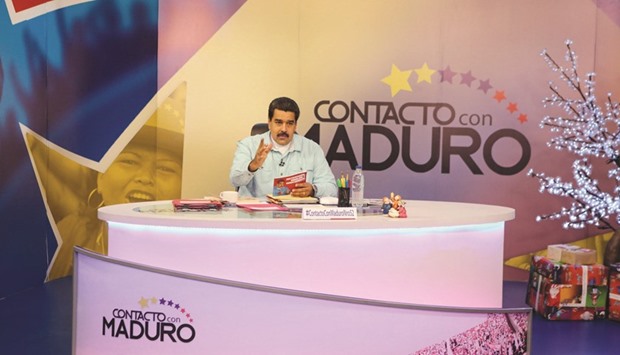Embattled socialist President Nicolas Maduro, who lost control of Venezuela’s National Assembly in polls earlier this month, said fraud had marred the vote, which was being investigated.
“I am not going to release preliminary results of the investigation ... There were a lot of things going on. Buying people’s votes, ... control of members of polling station teams and entire polling station teams,” Maduro said on his weekly television show.
“Criminals were buying votes ... There was a plan,” Maduro added on VTV state TV.
The president claimed the result of the December 6 legislative polls - in which the opposition alliance MUD won control of the National Assembly for the first time in 16 years - was “circumstantial.”
Maduro said he would soon reveal what he called the opposition’s “plan” to the nation, along with evidence. He did not immediately say when.
Earlier, the Supreme Court accepted appeals lodged by Maduro’s ruling United Socialist Party of Venezuela (PSUV) against the election of eight opposition lawmakers.
The opposition coalition, the Democratic Unity Roundtable (MUD), has accused the leftist ruling party of violating “the people’s will” by trying to roll back its gains, which it says were won fairly.
The opposition won 112 of 167 seats in the elections, a dramatic blow to Maduro and the “revolution” launched in 1999 by his late predecessor Hugo Chavez.
If the court challenge is successful, it could reduce that number to 104, which is shy of a two-thirds majority.
The super-majority gives MUD the power to put legislation to a referendum, remove officials from office, call an assembly to draft a new constitution and possibly seek to force Maduro from power before the end of his term in 2019.
Last week Maduro’s party used an extraordinary session in the final days of its legislative majority to name 13 new judges and 21 substitute judges to the 32-member high court.
The opposition, which boycotted the session, condemned the move.
MUD last week accused the ruling party of filing a court challenge against the election of 22 of its incoming lawmakers, calling the move an “attempted judicial coup.” The high court at the time denied it had received such a case.
Analysts warn of a tough political struggle ahead for the oil-rich but deeply troubled nation, which is mired in recession and facing a potentially chaotic period of divided government.

President Maduro sits at a desk during his weekly broadcast u201cen contacto con Madurou201d (In contact with Maduro) at the Miraflores Palace in Caracas.
